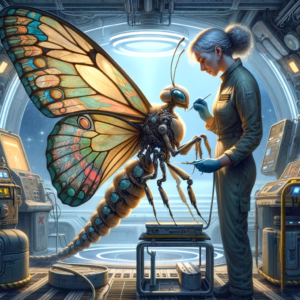by Mary E. Lowd
Originally published in Empyreome, September 2017

Lee-a-lei’s wide wings fluttered, casting pools of colored light that chased each other across the walls of the robotics laboratory. The harsh fluorescents from the ceiling softened to warm reds, golds, and chips of blue or green as they passed through her translucent wings.
“Are you sure?” asked the roboticist, a human woman named Maradia. As she looked at the beautiful lepidopteran alien, a veritable stained glass window come to life, it was almost impossible to believe that she’d agreed to take this commission. She almost hoped that Lee-a-lei would change her mind and leave Maradia with a month of wasted work and a useless pair of mechanical wings.
Lee-a-lei’s mouth parts stirred, and her long proboscis uncurled. The sounds she emitted were half flute, half violin. Yet Maradia could just make out the Solanese words, “I’m sure. If I’d stayed among my own people, I’d have cut them off long ago.”
“They’re so beautiful,” Maradia sighed.
“They’re vestigial,” Lee-a-lei intoned, holding out a knife with one of her six claw-like hands. “Cut them off.”
Reluctantly, Maradia reached out for the knife. Her human fingers brushed against the coarse hairs on Lee-a-lei’s claw-hand. A pool of ruddy light fell on the knife blade. Maradia shuddered, but she did her job. She ran the sharp blade along the crease between Lee-a-lei’s hard carapace and the soft flesh of her wing.
The blade came away gummy, and the wing crumpled to the floor like a discarded scarf. It twitched once. But Lee-a-lei didn’t even flinch, merely stood by patiently while Maradia cut off the second one.
Lee-a-lei stood now before Maradia, strangely diminished. Her body hadn’t changed, but the lack of her bounteous wings made it seem to have. Segmented arms and armor-like carapace, dozens of wiggly mouthparts nestled at the base of a long curled proboscis, and antennae that moved about restlessly above giant multi-faceted domed eyes — that’s all she was now. A monster who had been an angel. Maradia could see why Lee-a-lei had chosen to keep her wings so long after puberty while living in human society.
“Are you okay?” Maradia asked.
“I feel… so light!” Lee-a-lei twirled about, stretched out her segmented arms and danced like a nightmare come to life. “If I’d known how good I’d feel without them, I’d have done this years ago.”
“You still want the robotic ones, right?”
Lee-a-lei hesitated, antennae rotating, and for a moment Maradia thought she might get stiffed on this job anyway. Then the former-butterfly alien said, “Yes. Let’s put them on.”
This was the part Maradia was comfortable with: she lifted the pair of robotic wings, constructed from ultra-light alloys, and affixed them to Lee-a-lei’s back. Smart wires wormed their way from the base of the mechanical wings into Lee-a-lei’s carapace to bond with her nervous system. Little lights along the edges of the metal wings twinkled, showing they were operational.
“So pretty!” Lee-a-lei exclaimed, sounding like a happy orchestra. She flapped her metal gray wings proudly; they were barely a quarter of the size of her old ones.
Maradia looked down at the crumpled organic wings on the floor, still rich with vivid hues. As a roboticist, she was proud of the metal wings she’d made — they were crammed full of clever devices like personal climate-adjusters, gyroscopic balancers, jetpack boosters, and limited anti-grav — but they looked plain and gray in comparison to the ones discarded at her feet.
The metal wings were a common expression of Maradia’s skill as a roboticist; Lee-a-lei’s organic wings had been a marvel of biology.
“What do you want me to do with these?” Maradia asked, shoving her foot against the folds of colors.
“Whatever you want,” Lee-a-lei said. She was busy testing the anti-grav capability of her new wings — hovering lightly over the floor. “This is wonderful!” she exclaimed. “My old wings didn’t let me fly at all!”
“I’m glad you like them,” Maradia said, wondering if the old wings could be preserved and turned into some sort of cloak. “Come back in a couple weeks so I can give your new wings a tune-up, make sure they’ve bonded properly with your nervous system, that sort of thing.”
Lee-a-lei’s expression was hard to read, but her multi-faceted eyes sparkled. She paid double for her new wings, insisting that they were worth it, and left the laboratory an all new butterfly.
Maradia picked up the old wings off of the floor, draped them over her shoulders, and tried to imagine feeling their lovely weight and warmth as a burden.
 Read more stories from Brunch at the All Alien Cafe:
Read more stories from Brunch at the All Alien Cafe:
[Previous] [Next]
